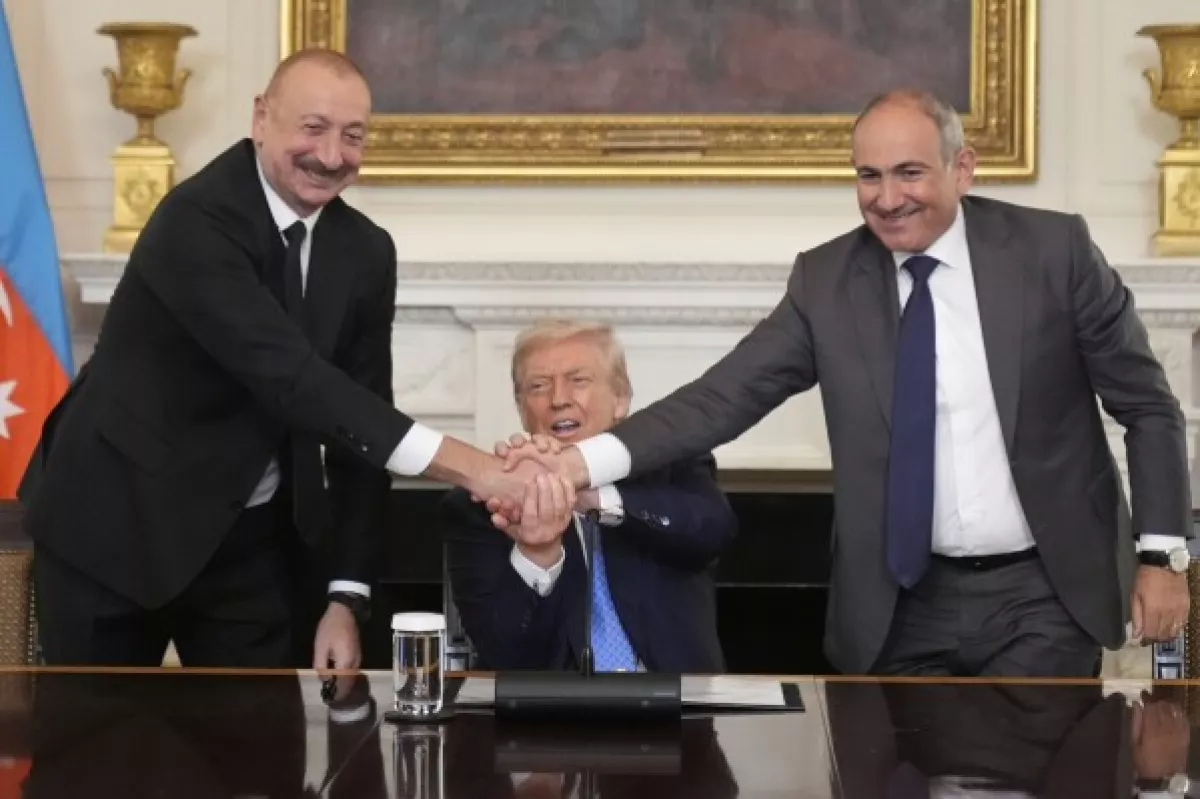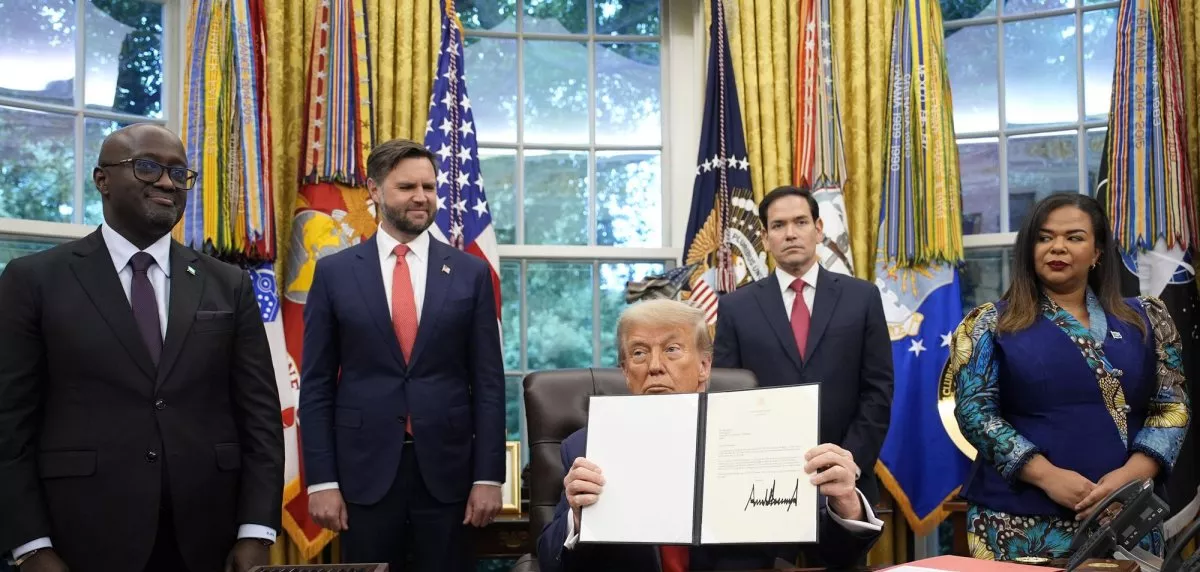Looking back at Trump’s involvement in brokering peace in “seven” wars
US President Donald Trump has pledged to act as a peacemaker and unifier in his second term. Reflecting on his first four years in the White House, he frequently cites his record as the first US leader in decades to avoid starting new wars.
After securing voters’ trust with such promises, he reiterated this commitment during his 2025 inauguration speech, declaring that his administration “will measure our success not only by the battles we win but also by the wars that we end — and perhaps most importantly, the wars we never get into.”
On August 8, during a landmark trilateral meeting between the leaders of Azerbaijan and Armenia at the White House to sign a pivotal agreement paving the way for normalized relations, President Ilham Aliyev emphasized Trump’s role.
“Over the past few months, you have brought peace to Asia, Africa and finally to the South Caucasus,” Aliyev remarked to Trump.
Amid heightened negotiations to end the Ukraine-Russia conflict, Trump has repeatedly underscored his administration’s role in halting “six wars.”
In an August 19 interview on Fox & Friends, he raised that figure to seven, prompting media outlets to review his mediation efforts. Axios reached out to the White House with a list of six conflicts for confirmation. In its response, a spokesperson added a seventh:
1. Azerbaijan & Armenia
President Ilham Aliyev and Armenian Prime Minister Nikol Pashinyan signed a Joint Declaration together with US President Trump, in which the parties reaffirmed their commitment to "opening of communications between the two countries for intra-state, bilateral, and international transportation for the promotion of peace, stability, and prosperity."
The document also stands as proof that the US witnessed the signing of a joint appeal by Azerbaijan and Armenia that requests the dissolution of the OSCE’s Minsk Process and related structures. Most importantly, the signed declaration puts in stone that Armenia will work with the United States of America "and mutually determined third parties, to set forth a framework for the 'Trump Route for International Peace and Prosperity' (TRIPP)" transport corridor.
The Azerbaijani leader reiterated during a meeting with Kalbajari residents on August 21 that the fact that the document for a peace agreement with Armenia has been initialled "actually puts an end to the Armenia-Azerbaijan conflict."

2. Democratic Republic of Congo and Rwanda
After decades of violent conflict, the DRC and Rwanda signed a US-brokered peace agreement at the White House in June 2025. The deal mandates “disengagement, disarmament and conditional integration” of armed groups in eastern DR Congo. Standing with Vice President JD Vance and Secretary of State Marco Rubio, Trump called the accord “a glorious triumph.”
“This is a tremendous breakthrough,” Trump declared before signing the document.
The agreement followed escalations in early 2025 when M23 rebels seized Goma and other areas. Facing losses, Kinshasa sought US help, reportedly offering access to strategic minerals in return for security assurances.

3. Israel and Iran
Trump is credited with halting the 12-day war that erupted in June 2025. Though brief, the conflict drew global attention for its potential to spiral into a broader regional war. Israel launched strikes on Iran’s nuclear facilities and military leadership, claiming the goal was to prevent Tehran from developing a nuclear weapon—a charge Iran denied. Shortly after ordering US airstrikes on Iran’s Fordo, Isfahan, and Natanz sites, Trump brokered a ceasefire and publicly pressured both nations to honour it.
Evelyn Farkas, executive director of Arizona State University’s McCain Institute, told the AP that Trump deserved recognition for stopping the war. “There’s always a chance it could flare up again if Iran restarts its nuclear weapons program, but nonetheless, they were engaged in a hot war with one another,” she said. “And it didn’t have any real end in sight before President Trump got involved and gave them an ultimatum.”
4. India and Pakistan
The deadly April attacks on Hindu tourists in Indian-controlled Kashmir pushed India and Pakistan closer to war than they had been in years, but a ceasefire was reached. Trump claimed US mediation, partly through trade concessions.
While Pakistan thanked Trump for his involvement, even recommending him for the Nobel Peace Prize though Foreign Minister Ishaq Dar chose another tone during talks with Al Jazeera, India has publicly denied Trump’s claims.
“PM Modi told President Trump clearly that during this period, there was no talk at any stage on subjects like India-US trade deal or US mediation between India and Pakistan,” Indian Foreign Secretary Vikram Misri said in a press statement in June.
“Talks for ceasing military action happened directly between India and Pakistan through existing military channels, and on the insistence of Pakistan. Prime Minister Modi emphasised that India has not accepted mediation in the past and will never do,” he said.
The US-Indian relations are experiencing some of their iciest times in decades with Trump remaining committed to his tough approach to New Delhi in regards to import tariffs.
Trump announced a 25 percent “reciprocal” tariff on Indian imports on July 31, effective August 7, aimed at forcing New Delhi to lower its barriers to trade for American goods. Trump subsequently signed an executive order imposing an additional 25 percent tariff on imports from India, beginning August 27, penalizing New Delhi for its continued purchases of Russian oil.
5. Cambodia and Thailand
The two countries agreed to an unconditional ceasefire in July after five days of deadly clashes. US pressure played a role, with Trump warning trade deals would stall if fighting continued. Talks were co-organized by Washington and attended by Chinese and US envoys.
6. Egypt and Ethiopia (First Term)
Trump claims he prevented war over Ethiopia’s GERD project during his first term, though no formal peace treaty was signed. The White House argues his intervention averted an imminent conflict.
7. Serbia and Kosovo (First Term)
In 2020, Trump brokered the Washington Agreement, a short-term economic normalization deal between Serbia and Kosovo, easing long-standing tensions following Kosovo’s 2008 independence declaration which has not been recognized by Serbia.
By Nazrin Sadigova








